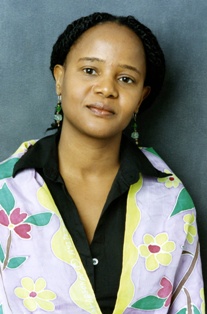 "There are many possible interpretations of what it means to create dangerously, and Albert Camus… suggests that it is creating as a revolt against silence, creating when both the creation and the reception, the writing and the reading, are dangerous undertakings, disobedience as a directive…
"There are many possible interpretations of what it means to create dangerously, and Albert Camus… suggests that it is creating as a revolt against silence, creating when both the creation and the reception, the writing and the reading, are dangerous undertakings, disobedience as a directive…
Create dangerously, for people who read dangerously. This is always what I've thought it meant to be a writer. Writing, knowing in part that no matter how trivial your words may seem, someday, somewhere, someone may risk his or her life to read them.
Coming from where I come from, with the history I have—having spent the first twelve years of my life under both dictatorships of Papa Doc and his son, Jean-Claude—this is what I've always seen as the unifying principle among all writers."
-- Excerpted from Chapter One (pgs. 10-11)
In 1818, Victor Cousin, as a visiting lecturer at the Sorbonne in Paris, coined the phrase "Art for art's sake," thus introducing the then novel notion that art ought to be appreciated on its own merits, meaning simply for its intrinsic beauty independent of serving any didactic function. This philosophy caught fire, thereby ushering in a redefinition of the prevailing point-of-view to the point where we generally expect that art be divorced from worldly concerns.
Has this attitude been widely-embraced or might it merely reflect the values of members of a leisure class able to ignore pressing issues of survival faced by the bulk of humanity? The question is legit, for flying in the face of that bourgeois aesthetic is Edwidge Danticat, an iconoclast who sees addressing the prevailing political and social questions of the day as a pivotal part of her calling.
A 2009 winner of a MacArthur Genius Fellowship, Ms. Danticat's contrary approach ostensibly emanates from the fact that she was born in Haiti and had to spend her formative years under the thumb of the ruthlessly repressive Papa and Baby Doc Duvalier regimes. And in Create Dangerously, a collection of essays based on a series of lectures delivered at Princeton University, the American immigrant tackles a variety of universal themes apt to resonate with anyone reflecting about the oppression they left behind in coming to the United States in search of fundamental freedoms, particularly Freedom of Speech.
The book opens with a gripping description of a public execution in the Sixties of a couple of Haitian political dissidents in a crowded Port-au-Prince town square aired live on TV, on a specially-declared national holiday when schools and businesses were closed in order to enable everyone to observe the grisly deaths by firing squad. But Edwidge points out that the true purpose of Duvalier's turning the event into such a spectacle was to discourage the populace from ever voicing their discontent with the status quo.
Obviously, in the case of Ms. Danticat, such attempts at intimidation ultimately backfired, for the inveterate firebrand grew up to stake her career on exposing injustice and challenging authority. Still, this tenderhearted tome, touching on themes ranging from assassinations to the recent earthquake in Haiti, is not solely political in scope. For, it also contains plenty of personal entries such as one recounting a recent return to the mountainous region where she was raised to visit long-lost relatives and friends.
The magical musings and flowery phrasings of a gifted wordsmith who, it must me noted, writes not in her native French but in the English of her adopted homeland.
Order a copy from The Skanner aStore: Books, Movies and Music
Create Dangerously:
The Immigrant Artist at Work
by Edwidge Danticat
PrincetonUniversityPress
Hardcover, $19.95
202 pages
ISBN: 978-0-691-14018-6
- Home
- News
- Opinion
- Entertainment
- Classified
- About Us
 MLK Breakfast
MLK Breakfast- Community
- Foundation
- Obituaries
- Donate
11-23-2024 6:51 pm • PDX and SEA Weather














































































































































































































































































































